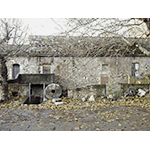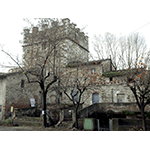Fulling-mills of Remole
In the Middle Ages, mills were at the basis of a complex production system and therefore of trade and economic development. There were many in the city of Florence, on its outskirts, and in other cities of Tuscany. The small mills in the countryside ground grain, while the large plants activated mechanisms capable of cutting trees and stones, crushing olives, making paper, and working wrought iron using hammers.
Along the course of the Arno were complex production plants made up of ten or more mills, a barrage or weir, made on the river bed in order to raise the level of water, and a canal or millrace, necessary to get the water to reach the mills.
Numerous fulling-mills were located, for example, in Rovezzano, Girone, Quintole and Remole. Fulling-mills were used for the first time in England in the middle of the 11th century. Their mechanics was based on a large horizontal cylinder, driven by a water wheel on which a row of staggered sprockets imparted an alternating movement to a series of hinged rods which thus tamped down the woollen fabrics inside vats, and also provided a heating action. The mechanisation of the fulling process was the evident signal of the great development attained by manufactories in the 14th century.
One of the most important fulling-mill plants, created around the mid 14th century, was the one in Remole, situated along the course of the Arno, in correspondence to the town of Sieci. The fulling-mills of Remole constitute one of the few still existing examples of an industrial factory of the late-medieval epoch in Italy, which at the same time documents the development attained by the wool manufacture of Florence. The entire complex of its hydraulic works has remained substantially unaltered.
Property of the Albizzi, Rucellai and Valori families, in 1541 the building at Remole was purchased by the Wool Merchants Guild, which conducted the activity of the fulling-mills until 1728 when, following its suppression, the facilities became property of Santa Maria del Fiore. In the Napoleonic age, the fulling-mills of Remole were taken over by the Chamber of Commerce of Florence. Today they are property of the Commune of Florence, though sited on the territory of Bagno a Ripoli.
****************************
Texts by Anna Toscano
English translation by Victor Beard
Last update 21/gen/2008





